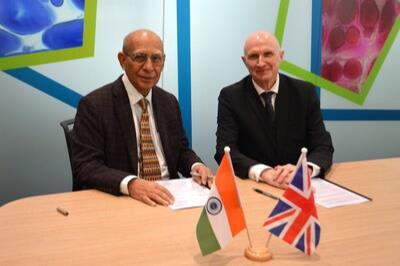SKAN Research Trust, promoted by Indian entrepreneur Mr. Ashok Soota, and UK-based Quadram Institute Bioscience have announced that they will apply the cutting-edge TraDIS-Xpress platform to study the action of traditional medical compounds on bacteria, thereby aiding in the reformulation and development of novel antibacterial regimens.

TraDIS-Xpress is Quadram’s proprietary genetic sequencing platform that is in the forefront of efforts to uncover new antimicrobial agents and develop better prebiotics and probiotics for health promotion.
The joint study titled the Application of TraDIS-Xpress in Microbiology for Healthy Living will be led by Quadram Principal Investigator, Prof. Mark Webber and SKAN’s Deputy Director, Dr Yogesh Shouche. The project is part of a larger Comprehensive Partnership Agreement between the two organizations that have ongoing international collaborations focused on gut health and developing gut microbial therapies to alleviate ageing and neurological diseases like Parkinsons.
Gut microbiome
An important aspect of the international collaboration is sharing the latest technologies in the study of the gut microbiome to augment Indian research capabilities. As part of this study, SKAN researchers will be trained on the TraDIS Xpress platform at the Quadram Institute in Norwich Research Park. This will facilitate the generation of data from large Indian cohorts that will aid in the development of India-specific therapies. Such data generation is also expected to hasten the TraDIS-Xpress platform’s development and amplify its applications’ scope.
Prof. Ian Charles, Director of Quadram Institute Bioscience, said: “I’m excited to see the cutting-edge genomic technology and expertise we have here in Quadram supporting our valued partners at the SKAN Research Trust to benefit the health of the people of India, and also further our fundamental understanding of the links between microbes and human wellbeing.”
Mr. Ashok Soota, Chairman & Managing Trustee of SKAN, said: “The research on novel microbial therapies raises our collaboration with QIB to a whole new level. We are grateful to Ian Charles for including SKAN as a partner in this transformational initiative.”
Capacity to adapt
Prof. Mark Webber, Group Leader, Quadram Institute Bioscience, said, “This project highlights the potential of the TraDIS Xpress platform for identifying and understanding the genetic basis behind bacteria’s enormous capacity to adapt for survival. I’m looking forward to helping our colleagues in India deploy it to support their research.”
Dr. Yogesh Shouche, Deputy Director, SKAN, said, “The three-year project will also study the mechanisms of drug resistance for key pathogens relevant to India and the action of selected food additives used in India on the growth of selected gut microbes.”
TraDIS-Xpress (transposon-directed insertion-site sequencing) is a high-resolution whole-genome assay that identifies which genes are likely to affect bacterial fitness in any given condition. This uses extremely dense, highly saturated mutant libraries to identify fitness differences at base pair resolution.
TraDIS-Xpress improves upon conventional transposon mutagenesis approaches through the use of outward-facing promoters. This allows the investigation of how gene expression, as well as gene deletion, affects bacterial fitness under a given growth condition. Additionally, it allows the investigation of essential genes that cannot be inactivated and therefore cannot be assayed by other approaches.







No comments yet